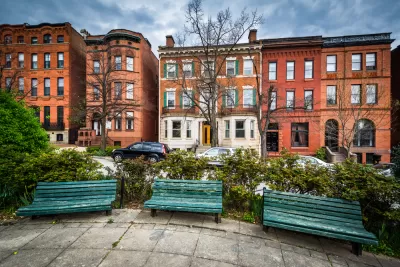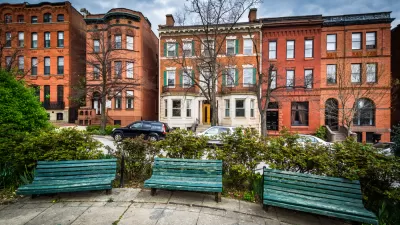The decision by the Baltimore County Council allows landlords to continue using "source of income" as criteria for prospective tenants. Such practices are often used to bar residents relying on housing vouchers.

"The Baltimore County Council rejected a bill Monday that would have made it illegal for landlords to discriminate against prospective tenants who use government housing vouchers to pay their rent," reports Pamela Wood.
"The council was required to consider the bill as part of a settlement of a housing discrimination complaint negotiated between the county government and the U.S. Department of Housing and Urban Development. Members voted 6-1 against it," adds Wood.
Wood details both sides of the political debate over the bill, which culminated this week after an "impassioned" public process last month. Wood shares talking points and arguments made by many of the politicians responsible for the bill's demise.
The news of the bill's failure also made the round on websites familiar to Planetizen readers, including an article on the Washington Post's Wonkblog, by Emily Badger. Badger writes that the bill's failure continues the tradition of legalized discrimination enabled by "source of income" criteria.
"Because this kind of discrimination is broadly accepted, the federal government’s largest housing program for the poor doesn’t work like it should," writes Badger. "Families with vouchers designed for the private market find much of the private market closed to them."
Jen Kinney also summarizes the news for a post on Next City. Kinney concludes by noting that "the county is required to take up the bill again after the next county elections in 2018."
FULL STORY: Baltimore County Council rejects housing anti-discrimination bill

Planetizen Federal Action Tracker
A weekly monitor of how Trump’s orders and actions are impacting planners and planning in America.

Chicago’s Ghost Rails
Just beneath the surface of the modern city lie the remnants of its expansive early 20th-century streetcar system.

San Antonio and Austin are Fusing Into one Massive Megaregion
The region spanning the two central Texas cities is growing fast, posing challenges for local infrastructure and water supplies.

Since Zion's Shuttles Went Electric “The Smog is Gone”
Visitors to Zion National Park can enjoy the canyon via the nation’s first fully electric park shuttle system.

Trump Distributing DOT Safety Funds at 1/10 Rate of Biden
Funds for Safe Streets and other transportation safety and equity programs are being held up by administrative reviews and conflicts with the Trump administration’s priorities.

German Cities Subsidize Taxis for Women Amid Wave of Violence
Free or low-cost taxi rides can help women navigate cities more safely, but critics say the programs don't address the root causes of violence against women.
Urban Design for Planners 1: Software Tools
This six-course series explores essential urban design concepts using open source software and equips planners with the tools they need to participate fully in the urban design process.
Planning for Universal Design
Learn the tools for implementing Universal Design in planning regulations.
planning NEXT
Appalachian Highlands Housing Partners
Mpact (founded as Rail~Volution)
City of Camden Redevelopment Agency
City of Astoria
City of Portland
City of Laramie





























